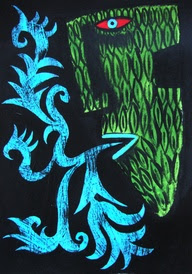 |
| One of the unused images by Clive Hicks-Jenkins made for The Foliate Head poetry collection from Stanza Press in the UK, 2012. The green man is an evocative image of exuberance and natural abundance and, I think, a good image for a poet. |
“
Seek Giacometti’s “The Palace at 4 a.m.” Go back two hours. See towers and curtain walls of matchsticks, marble, marbles, light, cloud at stasis. Walk in. The beggar queen is dreaming on her throne of words… You have arrived at the web home of Marly Youmans, maker of novels, poems, and stories, as well as the occasional fantasy. D. G. Myers: "A writer who has more resolutely stood her ground against the tide of literary fashion would be difficult to name."
 |
| One of the unused images by Clive Hicks-Jenkins made for The Foliate Head poetry collection from Stanza Press in the UK, 2012. The green man is an evocative image of exuberance and natural abundance and, I think, a good image for a poet. |
Alas, I must once again remind large numbers of Chinese salesmen and other worldwide peddlers that if they fall into the Gulf of Spam, they will be eaten by roaming Balrogs. The rest of you, lovers of grace, poetry, and horses (nod to Yeats--you do not have to be fond of horses), feel free to leave fascinating missives and curious arguments.
This all strikes a chord for me. I certainly think that schooling needs to encourage the creative that exists inside us all. And yes, how to support that work.
ReplyDeleteMaybe I would have been a better writer if I'd had this kind of education. Learning ancient languages would have been interesting though I did not have much luck with Latin, (two years did not nothing for me).
Perhaps Latin helped you in some subterranean ways that you hardly realize! One hopes...
ReplyDeleteIt is sad that more creative disciplines are under the axe in our public schools.
And I like the focus on a practical skill, rather than a path toward teaching. Of course, it's hard to tell a middle class or upwardly mobile parent that one is planning to be an electrician to support a vocation as poet!